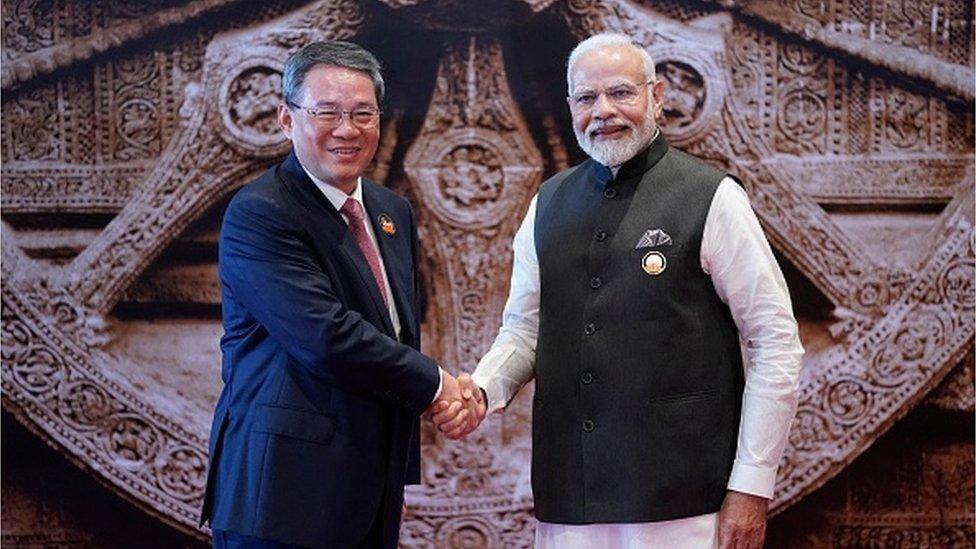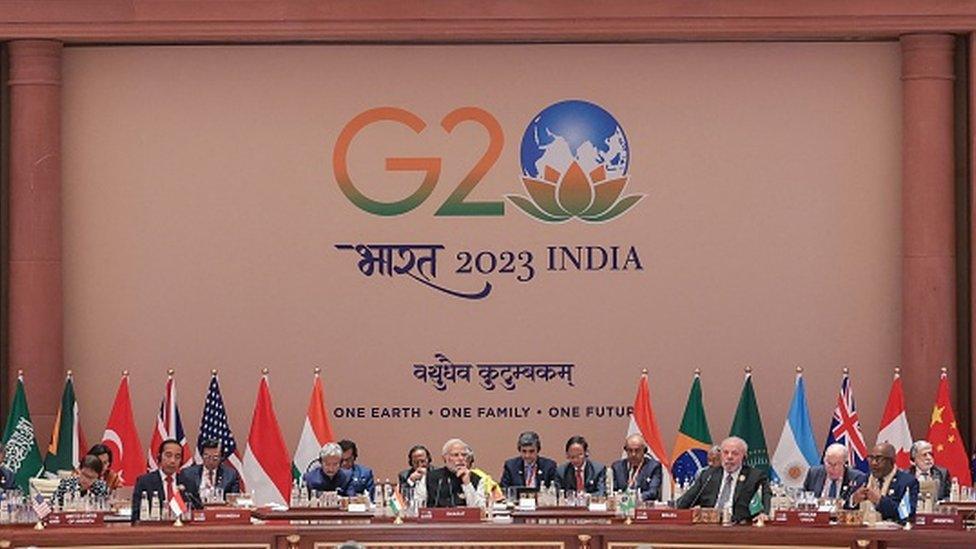G20: China says Delhi declaration sent a positive signal
- Published

China's delegation at the G20 summit in India was led by Premier Li Qiang
China has praised a joint declaration by G20 leaders in Delhi saying it has sent a "positive signal" to the world.
The world's biggest economies formally adopted the joint declaration at the G20 summit in India, without a single dissenting note, on Sunday.
China said the statement reflected its views and showed that the G20 was working together to tackle global challenges and promote development.
This is the first time that Beijing has commented on the declaration.
Several other countries, including the UK and the US, have praised the joint statement, which avoids condemning Russia, a key strategic ally of China, for its war against Ukraine. Russia too has hailed the declaration as a "milestone". But Ukraine, which was not represented at the summit, has expressed its disappointment saying the declaration was "nothing to be proud of".
China's delegation at the summit was led by Premier Li Qiang after President Xi Jinping skipped the meeting. Relations between China and India remain frosty over a border dispute that led to a clash three years ago in which 20 Indian and four Chinese soldiers were killed.
In a press conference on Monday, Chinese Foreign Ministry spokesperson Mao Ning said that China had always supported the G20 and believed that its members should "stand in solidarity and cooperate on global issues".
She was responding to a question by the China News Service about what Beijing thought of the summit and its outcomes.
"The summit adopted a leaders' declaration, which reflects China's proposition and states that the G20 would act in concrete ways through partnerships, sending a positive signal of the G20 working together to tackle global challenges and promote world economic recovery and global development," Ms Ning said.
She added that China had played a constructive role and "supported the summit in attaching importance to the concerns of developing countries" to reach "fruitful outcomes".

The joint declaration was formally adopted on the last day of the summit on Sunday
The joint declaration issued in Delhi uses more watered-down language compared with what was used in Bali last year to criticise Russia's actions in Ukraine.
In Bali, most G20 members had deplored "in the strongest terms the aggression by the Russian Federation against Ukraine".
In contrast, the Delhi declaration does not directly name Russia and talks about "the human suffering and negative added impacts of the war in Ukraine with regard to global food and energy security".
It calls on states to "refrain from the threat or use of force to seek territorial acquisition", which could be seen as directed at Russia, but also notes "different views and assessments of the situation".
At Monday's press conference, Ms Ning was asked whether China supported "the lack of direct criticism" in the declaration and whether it thought that the softer language would help in ending the conflict in Ukraine.
She responded saying that China's position on the Ukraine issue was "consistent and clear" and that the declaration "reflected the common understanding of all members".
"The Delhi Summit reaffirms that the G20 is the premier forum for international economic cooperation, not a platform to resolve geopolitical and security issues," Ms Ning added.
China would stay committed to promoting peace talks and work together with the international community for the political settlement of the Ukraine crisis, she said.
BBC News India is now on YouTube. Click here, external to subscribe and watch our documentaries, explainers and features.

Read more India stories from the BBC:
